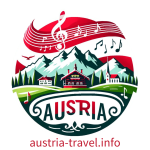Understanding the Currency in Austria: A Guide for Tourists
Embarking on a journey to Austria, a country known for its stunning landscapes, historic cities, and rich cultural tapestry, also means acquainting yourself with its currency. This guide aims to provide tourists with essential information about the currency used in Austria, ensuring a smooth and enjoyable travel experience.
The Euro: Austria's Official Currency
Since 2002, Austria has adopted the Euro (€) as its official currency, replacing the Austrian Schilling. The Euro is used in 19 of the 27 European Union countries, making it one of the most traded currencies in the world.
Banknotes and Coins
The Euro comes in seven banknotes and eight coins:
- Banknotes: €5, €10, €20, €50, €100, €200, and €500. Each note has a distinct size and color, making them easy to distinguish.
- Coins: 1, 2, 5, 10, 20, and 50 cents, and €1 and €2 coins. Coins feature a common European face and a national side. Austrian coins often depict famous Austrians and Austrian symbols, such as Mozart or the Belvedere Palace.
Exchanging Currency
Currency can be exchanged at banks, airports, and train stations. While exchange rates at airports and train stations may be less favorable, they offer convenience. It's advisable to compare rates at a couple of locations. Many hotels also exchange currency but usually at less favorable rates.
Credit Cards and ATMs
Credit cards, particularly Visa and MasterCard, are widely accepted in Austria, especially in hotels, restaurants, and shops. ATMs, known as 'Bankomats', are readily available throughout the country, allowing for easy withdrawal of Euros using foreign bank cards.
Tipping and Small Change
Tipping in Austria is customary but not compulsory. Rounding up the bill in restaurants or leaving a small amount (around 5-10%) is appreciated. Having small change is handy for tips, as well as for using public restrooms which often require coins.
Prices and Budgeting
Austria uses a value-added tax (VAT) system, and most prices you see will include this tax. It's important to budget for your trip accordingly, considering the cost of accommodations, food, travel, and sightseeing.
Familiarizing yourself with the Euro and understanding basic currency practices in Austria will make your travel experience smoother and more enjoyable. Embrace the opportunity to explore this beautiful country with its rich history, vibrant culture, and stunning landscapes, while confidently managing your expenses.
